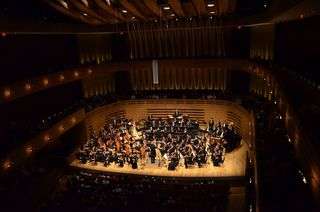|
Back
National Youth Orchestra of Canada Dazzles Montreal Audience Montreal
Maison symphonique de Montréal, Place des Arts
08/01/2018 - & August 10 (Kassel), 2018
George Gershwin: Catfish Row
Richard Strauss: Horn Concerto No. 2 in E flat major
Aaron Copland: Appalachian Spring
Alexander Scriabin: Poem of Ecstasy, Op. 54
Martin Mangrum (Horn)
National Youth Orchestra of Canada, Jonathan Darlington (Conductor)

NYO of Canada in Toronto (© David Popoff)
There are few pleasures as satisfying as hearing an orchestra of accomplished young musicians at the beginning of their careers. Their passion and enthusiasm combined with rigorous preparation and polished technique rarely fails to inspire the musical taste buds and hearts of an appreciative audience. This was evident in Montreal Wednesday evening during the National Youth Orchestra (NYO) of Canada’s mid-way stop on their annual tour of central Canada and, for the first time, abroad to three European cities.
Now in its 58th season, members of the NYO are chosen through national auditions and unite for an intense four-to-five week summer training program under world-class faculty and conductors. The students range in age from 16 to 28 and today provide more than 40 percent of the professional musicians playing in Canadian orchestras. The vast majority hail from Canada’s two most populous provinces—Ontario and Quebec—with a smattering from the western and eastern provinces.
Conductor Jonathan Darlington, Music Director of the Vancouver Opera, did a fine job at the reins of his large ensemble. The three big orchestral works on Montreal’s program were obviously chosen to show off the strengths of the individual members of the orchestra as well as the tight integration of each section. Gershswin’s Catfish Row set a light-hearted, fresh mood at the opening with lots of fine solo work, especially the early captivating solo from the concertmistress (attributions not given in the program). Darlington had tight control of the ensemble and a clear, meticulous conducting style that would have held no ambiguities of interpretation for this young charges. As in all three orchestral works Darlington wrought and sculpted some fine colors and textures from the musicians. Copland’s Appalachian Spring and Scriabin’s Poem of Ecstasy may have lacked tension and a united arc in places, but the brass played with polish and appropriate dynamics, the strings with one voice, the woodwinds with clear articulation and the orchestra, overall, sounded like a well-rehearsed, professional ensemble.
The choice of Strauss’ Horn Concerto No. 2, which led us into the interval, was unfortunate. The horn is arguably the most difficult instrument in the modern orchestra to master and confining this concerto to a 21-year old is a risk. Despite the fact that Martin Mangrum had just won the Canada Council for the Arts Michael Measures Prize, which was presented to him with a cheque for $25,000 (Cdn) on stage before the concert, Mangrum was not ready to perform as a soloist. More time and practice is required.
We have by now begrudgingly accepted the ubiquitous block of time of welcomes, introductions and other remarks by all and sundry to their captive audience before the first work on a concert program. Alas, on Wednesday, this unfortunate custom took a turn for the worse when two orchestra members took to the stage between the last two works on the program to, inter alia, thank sponsors and (it was at this point that my heart sank) mention TWICE that they were going to introduce the members of the orchestra. This, almost two hours into the concert, and just before the final big work. Mercifully, however, musicians were introduced not individually but by province. This did not set a felicitous tone for the final work and by then I couldn’t wait for the concert to end. I hope they don’t make this mistake in Europe. Many European concert-goers may not know what provinces are, let alone their names.
It is a mistake not to include a Canadian work on the program for all three European cities. The NYO of Canada is representing their country abroad and European audiences have plenty of opportunities to hear European and American works.
For program variations according to city, see the orchestra’s Web site.
Earl Arthur Love
|